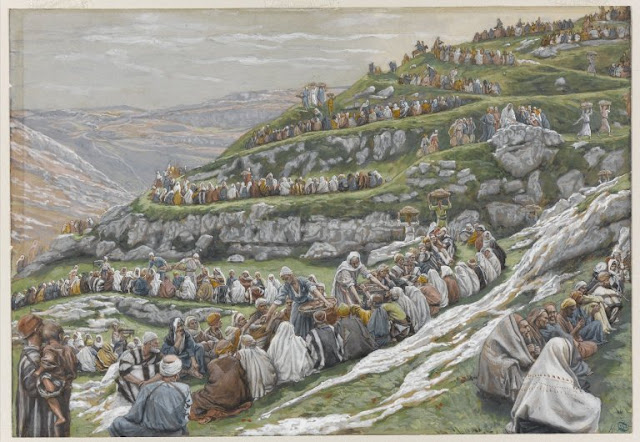Everyone, that is, except me, and three other seminarians. Because for my first two years at the seminary in Rome, we spent our Friday evenings working with the local St. Vincent de Paul Society. We loaded up a van with sandwiches, fruit, big pots of pasta, and hot tea, and then went out to the streets of Rome to feed the homeless. It was hard work and stressful. The people we served, mostly men, often had mental issues or were suffering from drug addiction or alcoholism. Many of them were immigrants, young men who had come to Italy from the Middle East or Asia to look for work. Often they asked us why we did what we did; they couldn’t understand why we ventured out each week to give them food. We told them it was because we were Christians – we served them because we served Jesus. It was rare that we talked much about Jesus to them; usually there was just time enough to give them the food, ask them how they were, and then be off to the next location. But we understood, as they came to understand, that our service was done out of love – for their souls as much as for their bodies.
In the Gospel today, Jesus multiplies the loaves and the fishes to feed the crowds. Having fed them by his teachings, he now nourishes them physically. The implication is clear: in Christ, God satisfies the deepest longings of human life, both body and soul. Whenever we feel starving, dry, or lifeless, we can come to Christ to be nourished and renewed. In his Son, God has provided a banquet of love for all people, if they will come to partake.
However, notice *how* he feeds the crowds. He doesn’t just make food appear out of thin air. No, he first commands the disciples to give the crowds something to eat. They are caught off guard, as he knew they would be: what do they have that can possibly feed so many? But nonetheless the command is clear, and the disciples try their best to fulfill it. They gather up their meager offering, five loaves and two fish, and bringing them to Jesus, they see how he takes what is insufficient and makes it overabundant. And then he gives back to them, and they in turn give the crowd of thousands enough to eat, so much indeed that there is something left over.
James Tissot, The Miracle of the Loaves and Fishes (c. 1886)
Jesus still works this way today, in and through his Church. As his disciples, we are commanded by him to feed the starving multitudes – to feed them with spiritual truth, and to feed the bodies that are starving as well. We love them because in them, Jesus himself is found, and because by loving them we lead them to him. By ourselves, our efforts are insufficient, no doubt. The physical needs we see around us can be daunting: poverty, homelessness, food scarcity, poor education, lack of health care – the list goes on and on. And the spiritual needs, at times, are even more overwhelming: lack of hope, discouragement, resistance to faith, depression and neglect. In the face of such great needs, it can be tempting to throw up our hands and say, “What can we possibly we do?”
But Jesus asks us to focus less on the results and more on our efforts. The disciples in the Gospel gathered what they had, handed it over to him, and let him take care of the rest. So too the Church labors to contribute to the care of those who are in need, physically and spiritually, in countless ways. You may know that the Catholic Church in the United States is the largest non-government provider of both education and health care, literally serving millions who are in need. Even here at Holy Rosary, our parish supports our school, our local food bank, and the ministerial alliance, and other causes by which we contribute to the well-being of those in our community who are in need. We can be proud of these efforts, even as we recognize there is more that we can do. But we also have to understand their importance for us, for each person and each family, how they reflect our own fidelity to what Jesus commands us. If our Christian charity is just about writing a check, and sending it in, are we really fulfilling what he commands? Might there be something more that we could do? Maybe it means looking at what we give to the parish, or to other charities operating in our town or in our diocese, and consider increasing our contribution. Maybe it is by supporting those who are serving by our prayers or by learning more about what is being done in our name. Maybe it is merely being attentive to those in our own social circles, family or friends or coworkers, whom we could help by having a concern for their physical or spiritual well-being.
Friends, in some way or another, Jesus calls each of us today to attend to those who are in need. Perhaps it is especially tempting in a pandemic, when we see so much suffering, to think that there are just too many needs for us to have any real impact. But Jesus commands that we not give into discouragement, but instead that we look to what we ourselves can give, meager as it may seem at times, trusting that it will be made sufficient by the power of Jesus. And when, as it happens at times, we are the ones who are in need? Then we also know where to turn: to the Lord, and to his Church, to find in the support, the encouragement, and the grace of the community of faith the hand of the Lord feeding us, answering all our needs.

No comments:
Post a Comment